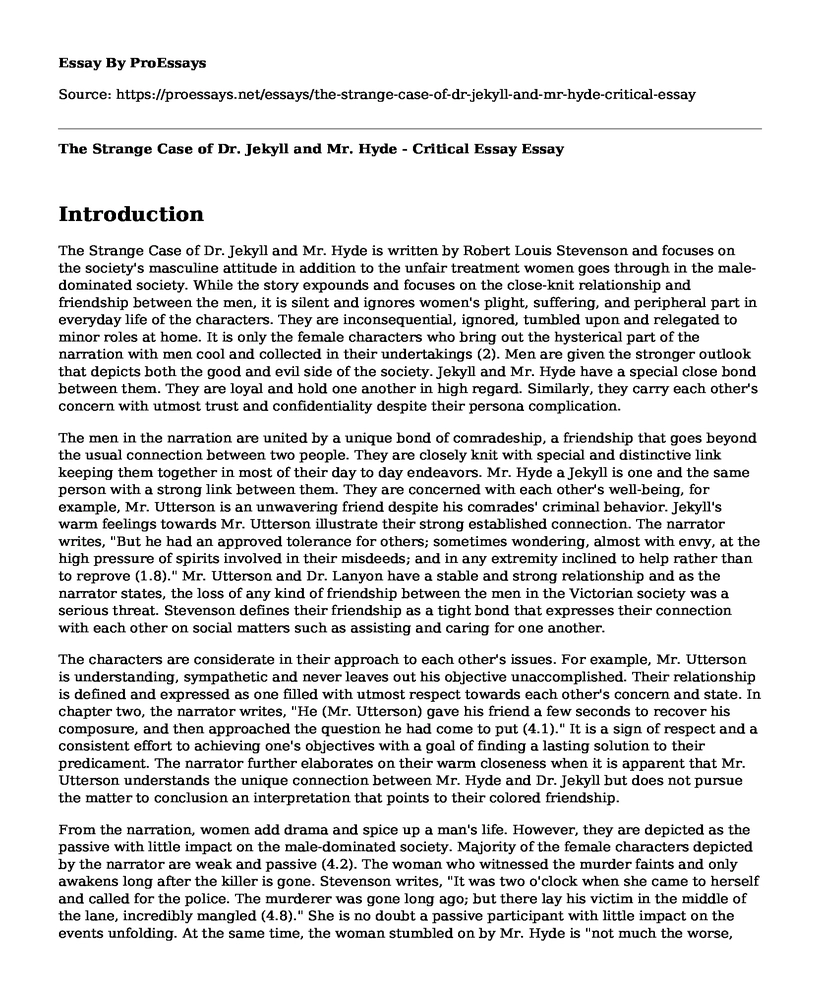Introduction
The Strange Case of Dr. Jekyll and Mr. Hyde is written by Robert Louis Stevenson and focuses on the society's masculine attitude in addition to the unfair treatment women goes through in the male-dominated society. While the story expounds and focuses on the close-knit relationship and friendship between the men, it is silent and ignores women's plight, suffering, and peripheral part in everyday life of the characters. They are inconsequential, ignored, tumbled upon and relegated to minor roles at home. It is only the female characters who bring out the hysterical part of the narration with men cool and collected in their undertakings (2). Men are given the stronger outlook that depicts both the good and evil side of the society. Jekyll and Mr. Hyde have a special close bond between them. They are loyal and hold one another in high regard. Similarly, they carry each other's concern with utmost trust and confidentiality despite their persona complication.
The men in the narration are united by a unique bond of comradeship, a friendship that goes beyond the usual connection between two people. They are closely knit with special and distinctive link keeping them together in most of their day to day endeavors. Mr. Hyde a Jekyll is one and the same person with a strong link between them. They are concerned with each other's well-being, for example, Mr. Utterson is an unwavering friend despite his comrades' criminal behavior. Jekyll's warm feelings towards Mr. Utterson illustrate their strong established connection. The narrator writes, "But he had an approved tolerance for others; sometimes wondering, almost with envy, at the high pressure of spirits involved in their misdeeds; and in any extremity inclined to help rather than to reprove (1.8)." Mr. Utterson and Dr. Lanyon have a stable and strong relationship and as the narrator states, the loss of any kind of friendship between the men in the Victorian society was a serious threat. Stevenson defines their friendship as a tight bond that expresses their connection with each other on social matters such as assisting and caring for one another.
The characters are considerate in their approach to each other's issues. For example, Mr. Utterson is understanding, sympathetic and never leaves out his objective unaccomplished. Their relationship is defined and expressed as one filled with utmost respect towards each other's concern and state. In chapter two, the narrator writes, "He (Mr. Utterson) gave his friend a few seconds to recover his composure, and then approached the question he had come to put (4.1)." It is a sign of respect and a consistent effort to achieving one's objectives with a goal of finding a lasting solution to their predicament. The narrator further elaborates on their warm closeness when it is apparent that Mr. Utterson understands the unique connection between Mr. Hyde and Dr. Jekyll but does not pursue the matter to conclusion an interpretation that points to their colored friendship.
From the narration, women add drama and spice up a man's life. However, they are depicted as the passive with little impact on the male-dominated society. Majority of the female characters depicted by the narrator are weak and passive (4.2). The woman who witnessed the murder faints and only awakens long after the killer is gone. Stevenson writes, "It was two o'clock when she came to herself and called for the police. The murderer was gone long ago; but there lay his victim in the middle of the lane, incredibly mangled (4.8)." She is no doubt a passive participant with little impact on the events unfolding. At the same time, the woman stumbled on by Mr. Hyde is "not much the worse, more frightened," but picks up an incredible hassle that brings a large crowd to her relief. The writer narrates, "At the sight of Mr. Utterson, the housemaid broke into hysterical whimpering and the cook, crying out "Bless God! It's Mr. Utterson," ran forward as if to take him in her arms (8.19)." The maids response is a clear indication of the little role and influence of women in the society. Stevenson has few female characters, a depiction of the bedrock role of women in the Victorian society and is only considered as beacons of virtuous moral inspiration. The narrator by giving women a back seat in the story focuses on the rising tension between the evil side of man and the good side. Men have relegated women to the periphery of social affairs with non-significant appearances to enhance a plot or an event. They no longer serve a significant purpose in the male-dominated society and are only identified if and when they raise their voices to social ills or at their convenience.
Conclusion
Women are like the forgotten flowers on a fertile ground. Despite their significant role in the society as caretakers and homemakers, they are relegated to the far periphery of most social aspects of the society with constant incidences of injustice, discrimination, and unfair treatment. It is no doubt that the story captures women devaluation in the current society as it is shown with the minor inconsequential roles they are given. It is a prevalent happening within the society with many cases of physical and emotional abuse customary in many quarters.
Cite this page
The Strange Case of Dr. Jekyll and Mr. Hyde - Critical Essay. (2022, Jul 08). Retrieved from https://proessays.net/essays/the-strange-case-of-dr-jekyll-and-mr-hyde-critical-essay
If you are the original author of this essay and no longer wish to have it published on the ProEssays website, please click below to request its removal:
- The Poem in the Park Essay
- Paper Example on Communication Models: Mythology Theory
- Literary Analysis of "To His Coy Mistress" Essay
- Essay Example on the Role of Learning in Middlemarch
- Essay Example on Hamlet's Unrequited Love for Ophelia: A Tragic Tale
- Country and Town - Literary Analysis Essay
- Essay Example on A Comparative Analysis of 'Hills like White Elephants' and 'Good People'







